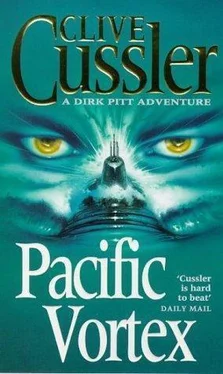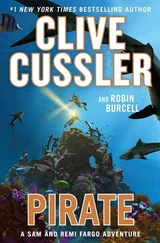He was already over an hour late for his meeting with Hunter, but there was something he had to do, some small hunch in the back of his brain that begged for a chance to be heard. He didn't quite know what he expected to find as the tires crunched the red
volcanic pebbles that lined the driveway, but he had driven two miles out of his way and there was no reason not to see it through. He parked the car and walked past a small, neatly carved sign that read:
BERNICE PAUAHI BISHOP MUSEUM OF POLYNESIAN ETHNOLOGY AND NATURAL HISTORY.
The main hall, with its balconies circling the upper levels, was crowded with neatly spaced exhibits of outrigger canoes, stuffed fish and birds, replicas of primitive grass huts, and strange, ugly carvings of ancient Hawaiian gods. Pitt spotted a tall, white-haired, proudly erect man arranging a collection of shells in a glass case. George Papaaloa had the true Hawaiian look, the wide brown face, the jutting chin, large lips, misty brown eyes, and a graceful way of effortlessly moving his body. He looked up and, recognizing Pitt, he waved.
«Ah, Dirk. Your visit makes my day one of joy. Come into my office where we can sit down.»
Pitt followed him into a neat Spartan office. The furniture was ancient, but refinished in a varnished sheen, and the books lining the walls were free of dust. Papaaloa sat down behind the desk and motioned Pitt toward a Victorian settee.
«Tell me, my friend, have you discovered King Kamehameha's final resting place?»
Pitt leaned back. «I spent the better part of last week diving along the Kona Coast and found nothing that resembled a burial cave.»
«Our legends say he was placed in a cavern beneath the water. Maybe it was one of the rivers.»
«You know better than I, George, that during the dry season your rivers are nothing more than dry gulches.»
Papaaloa shrugged. «Perhaps it is best that his burial place is never found and that his remains lie in peace.»
«No one wants to disturb your king. There is no treasure involved. Kamehameha the Great would be a great archaeological find. Nothing more. And, instead of some damp old cave, his bones would rest in a fine new tomb in Honolulu, revered by all.»
Papaaloa's eyes looked sad. «I wonder if our great king would appreciate being gawked at by you haoles»
«I think he could tolerate we mainland haoles if he knew that eighty percent of his kingdom was now populated by Orientals.»
«Sad, but true. What the Japanese failed to take with bombs in the forties, they took with cash in the seventies and eighties. Someday it wouldn't surprise me to get up and see the rising sun waving in the tradewinds over the Iolani Palace.» Papaaloa looked at Pitt steadily, his face expressionless. «There isn't much time left for my people. Two, maybe three generations and we will be totally melted into the other races. My heritage dies with me. I am the last of my family with pure Hawaiian blood.» He waved his arm around the room. «That's why I have made this place my life's work. To preserve the culture of a dying race, my race.»
Papaaloa stopped, gazing off vacantly out a small window at the Koolau Mountains. «My mind wanders more as I get older. Now then, you didn't come here to hear an old man ramble on. What's on your mind?»
«I want to know something about an area of the sea called the Pacific Vortex.»
Papaaloa's eyes narrowed. «Pacific Vor… ah yes, I know the place you mean.» He looked thoughtful for a few moments and then spoke softly, almost in a whisper.
A ka makani hema pa
Ka Mauna o Kanoli Ikea
A kanaka ke kauahiwi hoopii.
«Hawaiian is a very musical tongue,» Pitt said.
Papaaloa nodded. «That's because it has only seven consonants: h, k, I, m, n, p, and w. There can be no more than one consonant to a syllable. Translated in English the poem means:
When the south wind blows The mountain of Kanoli is seen And the summit seems peopled.
«Kanoli?» Pitt asked.
«A mythical island to the north. According to legend, many centuries ago a family tribe left the islands far to the southwest, probably Tahiti, and traveled in a large canoe across the great ocean to join other tribesmen who had immigrated to Hawaii decades before. But the gods were angry at the people's flight from their homeland, so they changed the position of the stars, causing the navigator of the canoe to lose his way. They missed Hawaii by traveling many miles to the north where they sighted Kanoli and landed there. The gods had truly punished the tribe, for Kanoli was a barren island with few coconut and fruit trees, taro plants, and no cool, clear streams of pure water. The people made sacrifices and cried out to the gods for forgiveness. Their pleas went ignored, so the people threw off their cruel gods and worked very hard under the harshest of obstacles to make Kanoli a garden. Many died in the attempt, but after several generations the people of Kanoli had built a great civilization out of the volcanic rock of the island, and, pleased at their accomplishment, they proclaimed themselves as their own gods.»
Pitt said: «Sounds like the trials of our Pilgrims, Quakers, and Mormons.»
Papaaloa uttered a long negative sigh. «Not the same. Your people kept their religion as a staff to lean on. The natives of Kanoli saw themselves as better than the gods they had once worshiped. After all, had they not built a paradise without them? They had overstepped the bounds of mortals. They began to raid Kauai, Oahu, Hawaii, and the other islands, killing and pillaging, taking the fairest of women back as slaves. The primitive Hawaiians were helpless. How could you fight men who acted and fought like gods? Their only hope was their faith in their own deities. They prayed for deliverance and they were heard. The gods of the Hawaiians caused the sea to rise up and bury the evil Kanolians forever.»
«My people also have a similar legend of a land being swallowed by the sea. It was called Atlantis.»
«I've read of it. Plato describes it quite romantically in his Timaeus and Critias.»
«It seems you're an authority on myths other than Hawaiian.»
Papaaloa smiled. «Legends are like knots on a string; one leads to another. I could tell you of tales handed down through the centuries in many faraway lands that are very nearly identical to, but predate, those of the Christian Bible.»
«Clairvoyants predict Atlantis will rise again.» «The same is said of Kanoli.»
«I wonder,» Pitt muttered, «how much truth lies behind the legend.»
Papaaloa leaned his elbows on the desk and gazed at Pitt over clasped hands.
«Strange,» he said slowly, «most strange. He used the same words.»
Pitt looked up questioningly. «He?»
«Yes, it was a long time ago. Right after World War Two. A man came to the museum every day for a week and studied every book and manuscript in our library. He was also researching the legend of Kanoli.»
«There must have been others through the years who found the story interesting.»
«No, you are the first since the other.»
«You have a razor-sharp memory, my friend, to recall someone that far back.»
Papaaloa unclasped his hands and stared at Pitt hesitantly. «I never forgot the incident simply because I never forgot the man. You see, he was a giant with golden eyes.»
Beyond puzzlement lies frustration, the neutralizing cloud hiding the next move. When a man enters that cloud, he is a man outside himself, a man who moves and acts instinctively. It was in such a state that Pitt found himself half an hour before noon, minutes after leaving George Papaaloa at the museum.
His mind was confused, shifting gears back and forth, trying desperately to piece the first two parts of the puzzle together. An old gray Dodge truck pulled out of the museum's parking lot and followed close behind. Pitt was ready to dismiss the trailing truck as fantasy — his subconscious was beginning to see enemy agents, complete with, trench, coats and beady eyes, lurking behind every clump of philodendron. But as he drove toward Pearl Harbor, the truck stayed with him around every corner as if tied by a rope.
Читать дальше












